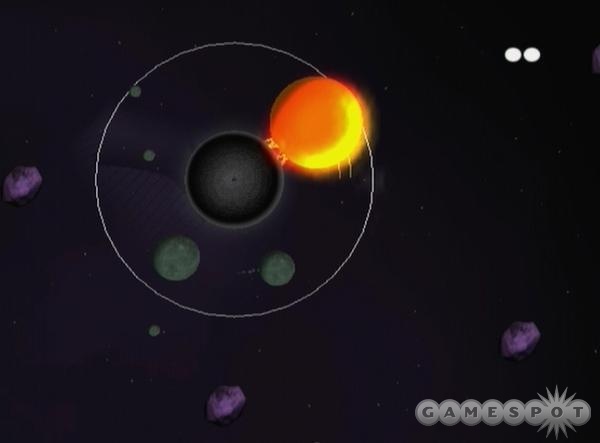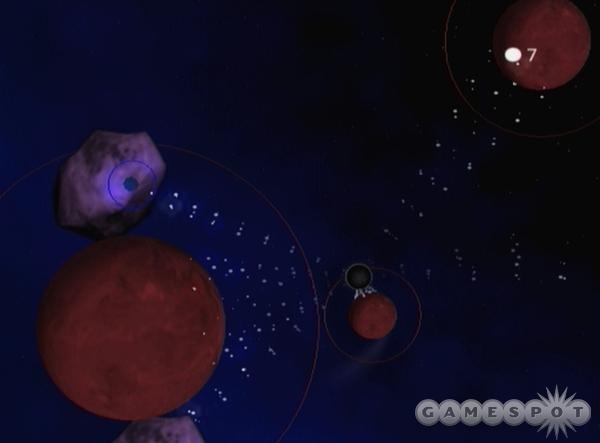Art Style: Orbient's bizarre take on Newtonian physics would probably make scientists uncomfortable, but it also makes for a unique puzzle game. In this single-player journey through 50 galactic levels, you manipulate gravity to maneuver a planetoid around a small two-dimensional cross section of the cosmos, increasing its diameter and drawing satellites into its orbit along the way. Orbient is unlikely to rock your universe and keep you glued to the screen, but six dollars (600 Nintendo points) is an easy-to-stomach price for some easygoing entertainment.

The goal of each level is to increase the size of your planet until it reaches a certain mass. You do this by banging into similarly sized planets, conveniently colored blue so you can easily identify which are useful, slowly increasing your mass as you avoid collisions with asteroids and larger bodies. As your diameter increases, previously off-limits planets become available to usurp, while smaller ones will not contribute to a size gain but can be caught in your orbit to become a satellite for extra points. What makes Orbient so clever is that you don't manipulate your planet directly, but rather you manipulate the gravitational pull of the surrounding celestial objects. When you press the A button on the Wii Remote, all nearby suns and planets exert a gravitational pull; pressing the B button causes them to repel your planet with equal vigor.
This sounds rather simple, but things can get complex. Turning on gravity as you float through the vacuum turns it on for all applicable objects, so its effects can come from every direction, and they are further influenced by your distance from those objects, as well as their size. It takes a short while to get the feel for these subtleties, and you'll watch in agony as your planet crashes into a flaming sun as you helplessly hold the B button. You can also orbit larger bodies, at which point the only object exerting force on you is the one you circle. Luckily, the game lets you pick up on these nuances gradually, slowly increasing the challenge while you get used to the bizarre physical laws of this unusual galaxy.
That gradual learning curve is a boon, because Orbient slowly adds new twists to the stages, such as sticking important objects into the middle of asteroids that exert no gravity (a real oddity, since they're the same size as planets that exert plenty of it); forcing you to navigate around giant rotating formations; and tossing in black holes that disrupt the orbit of everything around them. The final puzzles are real brain-ticklers, requiring precision that's tough to come by in a game that provides you with only tools of great imprecision. The spacey, new-age vibe helps minimize the frustration, though, and the simple, clockwork sound effects are cheesy but fit the similarly minimalist visuals. It's too bad that the look and sound have so little exuberance and personality. Orbient is based on a Japanese Game Boy Advance title, a tidbit of information that's all too apparent given its utilitarian production values.

For all its uniqueness, Art Style: Orbient is unlikely to be a game you'll return to once you've meandered through. Its slow pace, often requiring extended moments of inactivity, keeps it from developing the addictive charms of the finest puzzle games--an issue that might have been mitigated by the addition of leaderboards or some kind of multiplayer mode. Additionally, the high level of challenge in the later levels hinders the potential for a relaxed, psychedelic experience in the vein of Flow. Nevertheless, you probably haven't played anything like Orbient before, and at such a low price, it's a good value for an afternoon's worth of enjoyment.